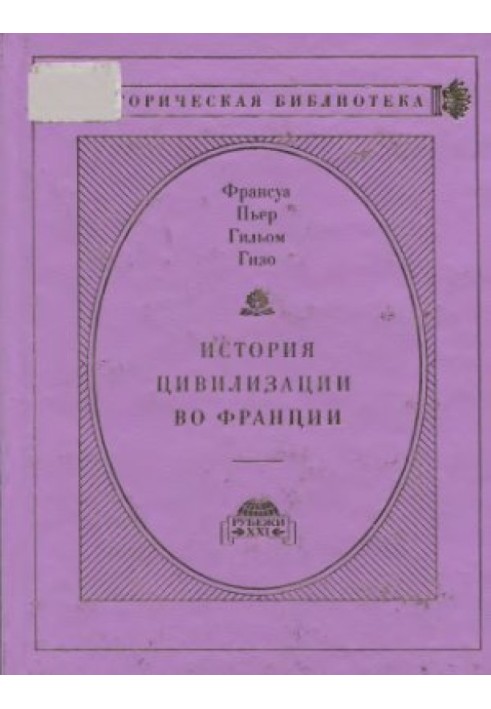History of civilization in France in 4 volumes. Volume III
 Instant download
Instant download
after payment (24/7)
 Wide range of formats
Wide range of formats
(for all gadgets)
 Full book
Full book
(including for Apple and Android)
“The History of Civilization in France,” the fundamental work of the classic of French historiography François Guizot (1787-1874), was at one time an event not only in scientific but also in public life, receiving great resonance in Europe and America. In Russia, its publication in the second half of the 19th century in the translation of the prominent medieval historian P.G. Vinogradova also found a wide response among the educated part of society. And at the beginning of the 21st century, this book has not lost its significance, which gives the right to recommend it to historians, students and everyone interested in the history of the development of world civilization.
CONTENTS: About the elements of national unity. From then on, French civilization began. The subject of this course will be the feudal era. The feudal era includes the 11th, 12th and 13th centuries, from Hugh Capet to Philippe Valois. The importance of the Middle Ages in the history of French civilization. The need to study the gradual formation of the feudal order. The disintegration of the feudal order into its main elements. The property of territorial property. The merger of supreme power with property. The hierarchical structure of the feudal association. On the state of territorial property from the 5th century to the 10th. Origin and the meaning of the word “feodum”. This is a synonym for the word “beneficium”. History of benefices from the 5th to the 10th centuries. Almost all land ownership becomes feudal. On the merger of supreme power with property, which constitutes the second feature of the feudal order. Two forms of German society: clan-tribe and squad. List and actual nature of feudal supreme power About the general association of feudal owners among themselves; the third characteristic feature of feudalism. The falsity of the picture of the feudal hierarchy portrayed by the admirers of feudalism. What method should be followed in the study of the feudal era. Simple fief is the basic element and primary particle of feudalism. The origin of feudal castles. The offices distributed in the form of fiefs. The dual origin of chivalry. The influence of religion and the clergy into knighthood. The rapid decline of feudal knighthood. On the state of the agricultural population or feudal village. The difference between colons and slaves. The differences and similarities of their position. How a person became a colon. On the position of the agricultural population in Gaul from the 5th to the 14th centuries. The peasant uprisings in the 10th and 11th centuries. The constantly continuing difference between the colons and the slaves. Progress in the position of the colons from the 11th to the 14th centuries. ABOUT mutual relations of feudal owners among themselves. Diversity and complexity of the elements of the feudal association, considered as a whole. The attitude of overlords to their vassals u003d the nature of these relations. Vassal citizenship, oath of allegiance and investiture. About feudal duties. About feudal service. Military service. Judicial service. Extortions. About some morals gradually acquired by overlords. Independence of vassals who served feudal service. About relations between vassals of the same overlord. About political guarantees of feudal society. What are political guarantees in general. About feuds between vassals. About feuds between a vassal and his overlord. About feudal courts and the court of equals. About the means to carry out judicial sentences. The impotence of feudal guarantees. The necessity of everyone the feudal owner to defend himself and deal with it himself. The real reason for the widespread and continued existence of judicial duels and private wars. The general character of feudal society. Intervention of society in judicial matters. Officially recognized right of resistance. Disadvantages of feudal society. The double element of every society. Weakness of the social principle under feudalism. Excessive predominance of individuality .inequality of power between fiefs. Increasing inequality of rights. Decline of public participation in matters of judicial proceedings. Origin of the offices of provost and bailiff. State of royal power at the end of the 10th century. Progress of the principle of legality. New character of royal power under Louis VI. Efforts of Philip Augustus to gather around themselves as major vassals and make them a means of government. The crown is freed from the power of the clergy. Legislative works of Philip Augustus. Royal power becomes national. Royal power in the reign of Saint Louis. Expansion of the king's judicial power. Successes in the independence of royal power in spiritual affairs. The position of royal power after the reign of Saint Louis. Different aspects of despotism. The actual nature of the composition and influence of national assemblies. The success of unlimited power in the judiciary. The struggle of legalists with the feudal aristocracy. Extraordinary commissions. The success of unlimited power in the matter of taxes. The struggle of the feudal aristocracy with unlimited power under the three sons of Philip the Fair. The weakening of royal power towards the end feudal eraNotes (compiled by V.D. Balakin)
Data sheet
- Name of the Author
- Франсуа Гизо
- Language
- Russian
- Translator
- Павел Гаврилович Виноградов


















